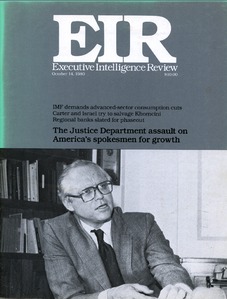Departments
Editorial
Out in the open.
Middle East Report
by Robert Dreyfuss
Kuwait: the next hot spot?
Dateline Mexico
by Josefina Menendez
Diaz Serrano finally goes to Tokyo.
Congressional Calendar
by Barbara Dreyfuss and Susan Kokinda
Facts Behind Terrorism
by Jeffrey Steinberg
Mossad runs anti-Semitic violence.
Economics
The IMF Demands Advanced-Sector Consumption Cuts
by David Goldman and Michael Hudson
De Larosière Calls for Restraint on Demand
Brazil Turns to the East Bloc
by Mark Sonnenblick
The planning minister’s negotiations with the U.S.S.R., and where the military stands.
Regional Banks Face Phase-Out
by Kathy Burdman
An overview of the administrative and legislative moves to give U.S. money-center banks all the business.
Farm Credit Law Set For Approval
by Susan B. Cohen
The latest phase of the fight between the ABA and the Farm Credit System.
American Output and the NICs
by Renée Sigerson
The implications of importing more industrial goods from the first-tier Third World nations.
Domestic Credit
by Richard Freeman
A short fuse under interest rates.
Gold
by Alice Roth
Lifeboat economics?
Trade Review
by Mark Sonnenblick
World Trade
by Laurent Murawiec
Steel consumers next in line.
Currency Rates
Business Briefs
Special Report
Justice Department Assaults America’s Growth Spokesmen
by Scott Thompson
An introduction arguing that Brilab and Abscam are part of a long-term plan to rid the United States of representative government.
The Targets: Builders of Industry
by Scott Thompson
The framed-up regional, Congressional and labor leaders are part of the political machines that have kept the economy going.
Civiletti’s Brilab operation: How the ‘Entrapment’ Works
by Scott Thompson
The criminal activities funded by the government to pick off noncriminals.
Documentation: The Justice Department’s Federal Witness Protection Program.
Ripping Up the U.S. Constitution
by Felice Merritt
A review of the process that has undermined the Bill of Rights and federal legal safeguards.
International
Carter and Israel Try To Salvage Iran Card
by Robert Dreyfuss
Robert Dreyfuss on the international maneuvers surrounding the Iraq-Iran war.
Israel Allies With Khomeini’s Iran
by Mark Burdman
More openly than the Carter Administration, the Begin government has supported the Muslim fundamentalists.
Italian Government: How Cossiga Was Ousted from Power
by Margaret Bardwell
The end of the Italian coalition was hastened by its enthusiasm for NATO expansion into the Persian Gulf.
Behind Der Spiegel’s Slander Operation
A map of the disparate networks that have been activated against the European Labor Party and Democratic leader Lyndon LaRouche.
International Intelligence
National
The ‘Unpredictable’ Carter Adds to Middle East Danger
by Konstantin George
The supply of AWACS to Saudi Arabia marked a new potential expansion point for the Iran-Iraq war. Documentation: The Administration’s moves since the war began.
Carter Campaign: The Strategy and the New Setbacks
by Kathleen Murphy
Carter is spending federal revenue fast to buy slipping votes.
Democratic Politics: Texas Liberals Back In Control
by Anita Gallagher
A report on the state’s Democratic Party convention.
Military Policy: ‘Small Is Ready’
Everyone is now bemoaning U.S. military unpreparedness on the defense-production level, and some propose a smaller, better maintained armed forces.
Energy Management: Recalculating the Oil Crisis Threat
The rationing advocates have not given up.
Michigan in a Fiscal Catastrophe
by Stephen Parsons
Stephen Parsons examines the auto shutdown’s consequences for the state’s industrial centers, focusing on Detroit.
National News



